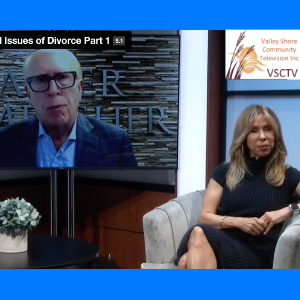
Navigating Emotional Issues of Divorce-Part 2
[Source: VSCTV]
Celebrity lawyer Peter M. Walzer, who is ranked as a best family law attorney in CA, discusses navigating the emotional issues of divorce part 2 on VSCTV.
Control Yourself With Positive Tones
Peter Walzer: You can set a tone. In certain situations, you’d set a tone and often it’s done in a therapist’s office, and that may be the best, or done in a public place so you’re safe. Because it’s an explosive issue and you’ve got to protect yourself. So if you can set a positive tone and carry on that positive tone, recognizing you have very little control over anybody else, never mind yourself. So if you could just basically say, and you sort of have to suspend reality and say, I’m going to take personal responsibility. I don’t even mean in the beginning all throughout, why would you do that? Because the only thing you have control over is yourself.
You can be very frustrated as somebody else, but you have no control. So as long as you’re dependent on what they do, you’re a slave. But if you can change your consciousness and say, “The only person I’m responsible for myself is myself, and I can be happy if I choose to be happy or I can be miserable. If I’m miserable, I’m controlled by them. If I’m happy, I’m controlled by myself.”
And like you said, if you can set the tone, positive tone, then you’re not subject to whatever they do. And you have no control over them. And that’s probably why you’re getting a divorce because you have no control over them, and one of you or both of you have gone astray. So control yourself and don’t depend on the other person and what they do, because you have no control over that.
Create a Financial Plan
I just also wanted to say from the beginning, it’s good to have a plan, and divorces are a financial plan. And if you look at it as a financial plan, a difficult one granted, and you get that help, a lot of your fear can be assuaged, because you have a plan to deal with it and where you want to get.
I tell people, your judgment of divorce can be written from the beginning. You should know where you’re going. Likewise, you should have a plan for your kids that you want to raise them together. And this is in basically healthy people. There are situations where your spouse or your partner is not capable of raising the children. They shouldn’t have anything to do with that. But in most cases, you can come up with a plan that is going to be for the kids and going to benefit them.
Sylvia Guinan:
Yeah, no, I agree. I’m big on planning. I love planning, and I think people are visual. So when we talk about a plan, and particularly women, I think men are a little bit more comfortable with the division of assets and numbers and what they’re going to have. I think women in general like to see it on paper. It’s not the numbers that motivate women, it’s understanding what those numbers can do for them and their children.
We’ve talked about this, but I think when we partner with divorce attorneys, we really love to illustrate what it is that you think might be the outcome so that the client could feel a sense of clarity in terms of understanding what their situation might look like, a sense of confidence they could see on an ideal scenario or worst case scenario, settlement, where they’re going to be. And then I think empowering a client with a sense of control that they’re going to still have choices over their future and they still have the power to rewrite the story they want.
Peter Walzer:
Exactly. If everybody could meet with you, Sylvia, at the beginning and get that plan, I think they’d be a lot easier with their family law issues. I also find that people often react out of anger. They’ll call their attorney, they’ll demand certain actions, but they should also be looking at what is it going to cost?
I can do this, I can fight over one day of time or one hour of time, but it’s going to cost me $300,000. Do I want to be spending my money that way? And there’s also emotional capital. Do I want to be spending two years of my life fighting somebody I once loved? I chose them, I chose to have kids with them, and now I’m going to spend hundreds of thousands or millions of dollars in professional fees and years of my life. The money you can make back, maybe, the emotional capital can’t. So divorce is a strange area of law where you’ve got heightened emotions and you’ve got lots of money, and the cost of both have to be taken into account and how you’re going to resolve your case and what attorneys and professionals you’re going to have behind you.
Sylvia Guinan:
Yeah, no, as you’re saying all of that, I so agree, and I think of my own situation, my own divorce, and you know what? It’s never easy. I think we do try to navigate with love and grace as much as we can. And the beauty of that is if you can, and you cannot argue over that one hour or you give in on a couple of things, you can both have access to the kids. And really, when I was writing my book, I had done so much research on kids and how they actually do during and post-divorce. And it was interesting that it’s never really the divorce, I mean the divorce is a big disappointment, they do feel like you said, a huge sense of loss. They want their mom, they want their dad. They feel a loss of control, a lack of control over their lives.
So I think it’s the responsibility as parents to show up and to try to get along and to not make the children feel the uncomfortableness or the tension that’s in the room. And I think that if you can get along or give on certain aspects and give certain things, we laugh because we had had this very detailed custody plan, which we don’t really even use anymore. Now, it’s like, “oh, well it’s your Christmas, so what time should I be over and what can I bring?” And vice versa. And the nice thing is that nobody has to miss out on the kids. And the even better part is the kids don’t have to feel torn. They still have their mom and dad.
Navigating Holidays in Divorce
Peter Walzer:
Yeah, I went through the same thing. It was really easy for the kids if we all shared the holidays together, even though I was remarried and she was with somebody else because the kids didn’t have make a choice, and putting them in the middle makes it difficult for the kids. I liken it to stabbing them in the heart. It’s like, why create unnecessary drama about it? Now, you may have every good reason, you may have been betrayed. There may be trust issues relating to money or love, but you’ve got to put the kids above that and not put them in the middle.
And one model I like to think of is your children are combination of both of you. So if you criticize the other parent, you’re criticizing some aspect of your own child because they’re a blend of both of us for good or for worse. And that may be painful in certain circumstances when you don’t like the qualities of the mate you picked, but that’s the reality. The children are generally a combination of both of you.
Sylvia Guinan:
That is so true. And I even see that with the adult children of couples that have helped navigate. I mean, adult children will say, “I don’t want to hear what they have to say about my dad, or what she says about him, or he says about her. They don’t want to know. They just don’t want to know. So it is so important to keep adult issues or marital issues as marital issues. And I think an important thing to try to get people to understand is that while the marriage didn’t work, when there’s children, it really is essential to try to make the family always work, right? Because there should be a sense of family for those kids so that they’re not as traumatized so that they can, and I’ve seen kids come out of it, and actually I think they come out quite well if the parents behave quite well. And I actually in some instances feel because they’ve had to navigate this trauma, that they actually perform even incredibly well and their social skills and their ability to navigate relationships because they’ve been through this difficult process.
Setting Positive Examples for Kids
Peter Walzer:
Life seems to be a series of opportunities for growth or crises. If they can see their parents handle a crisis in a constructive way and come out on the other end as maybe not friends, but at least colleagues who work together, that’s a positive message for them. They’re getting the message. You can resolve issues with people, you can reconcile your differences, you can act like adults and be mature and put your personal petty problems and issues behind you in the best interest of your children and the greater good. Not every relationship works out. It’s sad, it’s bad. But that’s life, right? I mean, it happens. And children need to learn constructive resolution of problems.
Sylvia Guinan:
Yeah. No, I absolutely agree with you there. And Peter this time is going pretty quickly, as we wrap up our last few minutes, let’s come full circle now and talk about something you and I have had many conversations about is for those thinking about getting married or if somebody was watching their kids or thinking of getting married. We talked about, prenups, postnups, and you had mentioned to me that you’re seeing more of a trend people are doing more and more than ever before, right?
Setting Tones with Prenups
Peter Walzer:
That’s so true. And really, especially in a prenup, you’re going to set the tone for the rest of the relationship. And you may be dooming it or you may be fertilizing your relationship with lots of good food and understanding. And I like prenups because, and I’m talking about for people with wealth and special situations and maybe second marriages for older seniors where there are children, it opens up the discussion about money. And if you can talk about money before marriage, you’re really on the right track. And again, just like a divorce is a financial plan, a premarital agreement is a financial plan. So you’ve got to bring your professionals in like Sylvia to say, what should we share? What’s mine? What can we have? If you don’t want to share anything and there’s no transfer, maybe marriage is not for you. But marriage is a contract between two people who love each other, who to a certain extent are relying on each other. And there’s got to be a sharing. There’s got to be a financial plan where both people will end up in retirement with sufficient money to take care of themselves, whether they’re together or apart.
Sylvia Guinan:
Yeah. And I’ll wrap up by saying again, I think you do such a tremendous job. That is a very difficult conversation. And I know you’ve mentioned to me too that it’s a conversation that you prefer that the couple even have before they come to see you, right? And I do agree, that if you can’t have those conversations now, it’s not going to get easier later. And it’s so much better, to have those conversations before you get yourself intertwined in a marriage again.
Peter Walzer:
Exactly. I mean, if the first time you see the agreement is from your lawyer and you haven’t discussed it, it doesn’t bode well, does it? I mean, wouldn’t you rather sit down and have the discussion? I remember a couple, the guy was very mistrustful. I said, “Why don’t you talk to your fiance?” And he sat down with her and they were in front of a fire and were drinking wine, and they spent all night talking about it, and he felt so much trust. Fast-forward 20 years later, they had children. They were happily married. He was coming into it with a negative, fearful perspective. And when he sat down and talked to her, they developed trust and were able to share wealth and have a happy life. So that sets a tone for a wonderful relationship, if you can talk about these difficult subjects.
Sylvia Guinan:
Well, what better way to end than that happy ending? I liked that happy ending. That was a great story, Peter. Thank you again. Thank you so much for taking the time to be with us today. Like I said, to me, you are really one of my heroes. I love helping people navigate divorce with love and grace, and I love being surrounded and having friendships with someone like you who really does do such a phenomenal job at helping people divorce with love and grace and preserve the family. So thank you. Thanks for everything that your top law firm does, and we hope to have you back on soon.
©2024 VSCTV. No claims made to copyrighted material. Aired 5/29/24.
5 More posts from Peter M. Walzer on Celebrity Divorce
More on High Net Worth Divorce

Dividing a Business in Divorce





